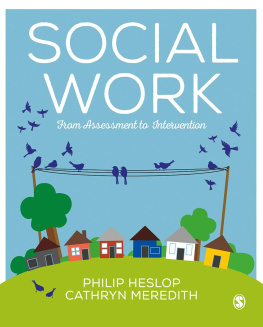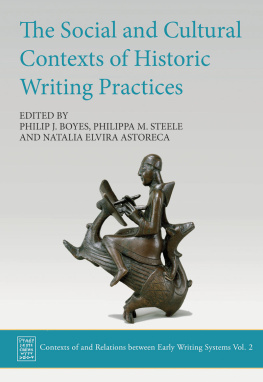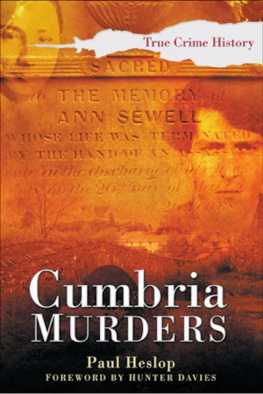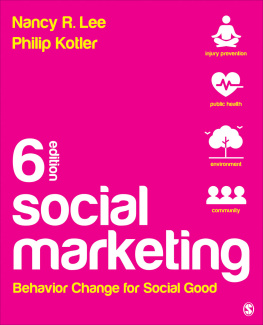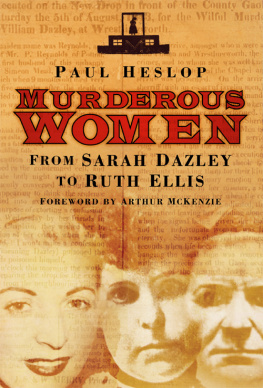SAGE Publications Ltd
1 Olivers Yard
55 City Road
London EC1Y 1SP
SAGE Publications Inc.
2455 Teller Road
Thousand Oaks, California 91320
SAGE Publications India Pvt Ltd
B 1/I 1 Mohan Cooperative Industrial Area
Mathura Road
New Delhi 110 044
SAGE Publications Asia-Pacific Pte Ltd
3 Church Street
#10-04 Samsung Hub
Singapore 049483
Philip Heslop and Cathryn Meredith 2019
First published 2019
Apart from any fair dealing for the purposes of research or private study, or criticism or review, as permitted under the Copyright, Designs and Patents Act, 1988, this publication may be reproduced, stored or transmitted in any form, or by any means, only with the prior permission in writing of the publishers, or in the case of reprographic reproduction, in accordance with the terms of licences issued by the Copyright Licensing Agency. Enquiries concerning reproduction outside those terms should be sent to the publishers.
Library of Congress Control Number: 2018943077
British Library Cataloguing in Publication data
A catalogue record for this book is available from the British Library
ISBN 978-1-5264-2448-8
ISBN 978-1-5264-2449-5 (pbk)
Editor: Kate Keers
Assistant editor: Talulah Hall
Production editor: Victoria Nicholas
Marketing manager: Camille Richmond
Cover design: Wendy Scott
Typeset by: C&M Digitals (P) Ltd, Chennai, India
Printed in the UK
About the Authors
Philip Heslop (Phil)I have been a social worker since 1992 and chose social work as a profession to challenge inequality and discrimination. I have worked mainly in childcare social work, and from 1995, specifically in fostering and adoption. I have worked in statutory, voluntary and independent social work and have worked in all four countries of the UK. I developed a specialism working with male carers, as well as caring for children on the autism spectrum. Having held a wide range of practice, training, reviewing and management roles, I am also a passionate educator. I am qualified to teach adults and children, have been an NVQ assessor and am a Fellow of the Higher Education Academy. I completed a PhD on foster fathers through Durham University, and joined Northumbria Universitys teaching team in 2013. I teach across all social work programmes, focusing particularly on social work assessments and interventions. I supervise PhD students, and I am currently principal investigator on an evaluation of simulation-based learning in social work programmes.Cathryn Meredith (Cat)I qualified as a social worker in 2001, and went on to practise in a variety of mental health settings. I became an Approved Social Worker (ASW) and later an Approved Mental Health Professional (AMHP). I developed a specialism in working with people diagnosed with emotionally unstable personality disorder and self-harming and suicidal behaviours. I qualified as a Best Interests Assessor (BIA), and went on to become a local authority Mental Capacity Act lead. From 2013 until its closure, I was a College of Social Work accredited Expert Safeguarding Adults Practitioner. I left practice in 2013, to teach and research at Northumbria University. I teach across all qualifying and post-qualifying social work programmes, focusing particularly on social work with adults, mental capacity, adult safeguarding and mental health. I am a Fellow of the Higher Education Academy and I am currently completing a PhD, which explores how adult safeguarding is performed with people experiencing dementia.
Acknowledgments
Philip ~ For Cath and my adult children Joe, Simon and Siobhan and my granddaughter Lucy Heslop and her mam, Kayleigh. Thank you. Also in memory of Maureen Heslop, Brian and Maureen Dowling.
Cathryn ~ For my loves, Stew and Mia, and for Sarah Beer and Alan C. who taught me most about social work. Thank you.
We would both like to thank Kate Keers for getting us here!
Introduction
Social work is about making sense of complex and difficult situations so that we can understand how to navigate towards solutions. We assess to inform decisions about how to intervene with people in situations of need and risk, and the decisions that we make can have an enormous impact on their lives. We need to understand how to skilfully incorporate a range of knowledge, theories and interventions so that our practice is robust and informed, and results in credible, evidenced-based judgements. This book is an accessible, comprehensive resource that will support you develop in-depth knowledge and understanding of social work assessment and interventions. Whether you are undertaking your social work training, are in the early years of practice, or are a more experienced social worker attending to your continuing professional development (CPD), this book will equip you with the skills you need to assess and intervene effectively. We reference a range of key theories that can inform and enhance assessment and intervention, drawing particularly on contemporary knowledge about social work practice. Initiatives and innovations age, alter and change; however, a constant feature of social work is making sense of complex problems and intervening to make a positive difference. In short: assessing to intervene.
Social work is evolving
It is rather clichd to say social work is in flux; our professional history has been about change. Social work exists at the crossroads where social issues and social change intersect, and whilst there is a need for the profession, it always will. Whilst there is much political debate about the extent, nature and cause of social issues, there is no doubt that they are complex and problematic. Social work takes a central role in helping society to address these issues. It has progressed from its origins as a voluntary, charitable activity, to a highly regulated profession. Our role has become increasingly focused on safeguarding vulnerable children and adults from abuse and neglect, and in situations where significant harm or fatality occur, the profession comes under intense scrutiny and criticism.
To ensure that social workers are accountable and equipped for increasingly complex practice, professional standards and guidance have rapidly expanded. The Professional Capabilities Framework (PCF), first implemented by The College of Social Work in 2012, sets out consistent expectations for social workers at every stage in their career, from initial social work training, through to continuing professional development after qualification (BASW, 2018). Since 2014, the Chief Social Workers for England have been introducing a series of Knowledge and Skills Statements (KSS) setting out the expectations for social workers in specific roles and settings (Department for Education, 2014; Department of Health, 2015). The PCF and the KSS emphasise that in every practice setting, and at every career stage, social workers must be able to use their knowledge and skills to assess and intervene effectively in peoples lives.





